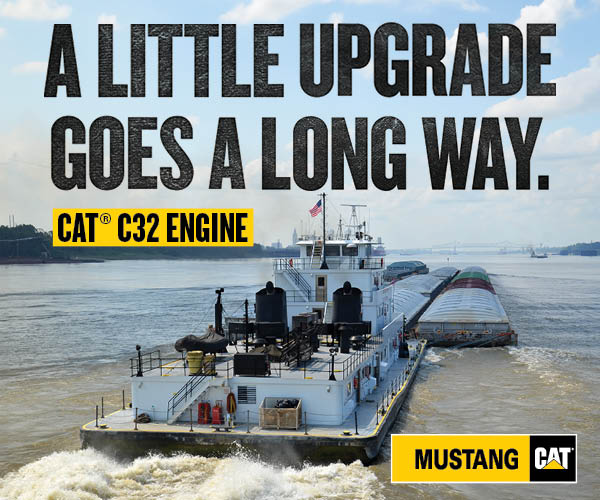Damen Shipyard Delivers Cutter Suction Dredge 350 to Dutch Marine Contractor Heuvelman Ibis
Y MARSHA COHEN
On April 14 a new Cutter Suction Dredge (CSD) 350 was delivered by Damen Shipyard to marine contractor and dredge company Heuvelman Ibis in Delfzijl the Netherlands. The new cutter suction dredge ordered in January and delivered in April began work almost immediately on its first project in the Winschoterdiep in the Province of Groningen the most north-eastern province of the country. Heuvelman Ibis is headquartered in Delfzijl in the province of Groningen with an affiliated German office Heuvelman Ibis GmbH in the north German port city of Leer.
Heuvelman Ibis BV is a family company established almost 50 years ago in Krimpen aan de IJssel in the Province of South Holland. “BV Bagger- en Overslagbedrijf Heuvelman Ibis” as it is known in Dutch was named after its founder Arie Heuvelman and his ship Ibis a refurbished sailing clipper and equipped with a mounted crane. In the mid-1970s Heuvelman saw the maritime opportunities in the northern parts of the Netherlands and sailed to Delfzijl in Groningen to work on the new canal and harbor being developed there. What started as a two-year dredging operation became a permanent move.
With the growth of the chemical industry in Delfzijl and the need for maintenance of the Vecht River in Overijssel as well as the development of the seaport at Eemshaven the company broadened its activities. This growth continues today. The company which started with one dredge has now an established fleet and more than 80 employees working domestically and abroad including in Curacao. The work in Germany accounts for about one third of the company’s turnover.
The Winschoterdiep project is in line with Heuvelman Ibis’s strong presence in dredging coastal works and marine construction in the north of the Netherlands. The Winschoterdiep canal is 35.5 kilometers (22 miles) in length and approximately 100 meters wide (328 feet). It is one of the oldest canals built in Groningen and is still in use. With an increase in shipping activities the deepening and cleaning of the canal is a necessity. The dredging works will involve the extraction of some 220000 cubic meters (287750 cubic yards) of sediment. To accomplish this task the Netherlands-based marine contractor Heuvelman Ibis required a heavy-duty dredge as quickly as possible. The order for the cutter plus two Damen BS 350 booster stations to enable pumping over long distances were all placed in January and delivered three months later. The dredging works at Winschoterdiep for maintenance and deepening started a week after delivery and assembly of the new equipment.
DEEPENING CONTRACT
The contract is being executed at the request of the Province of Groningen. The deepening and cleaning of the canal is necessary for the growing container shipping and other cargo ship activities traveling between the cities of Groningen and Foxhol and Veendam. The dredged material is pumped through a discharge pipe to the dredged material depots designated by the province. The job will employ six people and is estimated to be completed in nine months and should be ready before the end of 2017. Last year Heuvelman Ibis completed maintenance dredging and deepening of another part of this inland waterway.
To complete this last part of canal to Winschoten Heuvelman Ibis invested 2 million euros (USD $2.18 million) in the new CSD 350. Built by shipbuilder Damen the cutter suction dredge is considerably quicker more efficient and can work more precisely because the new dredge uses high-end computer software to guide the dredging.
When completed the Winschoterdiep will fulfil the demands for the so-called class IV waterway as established by the European Union. Various parts of the waterway will vary from a depth of 3.70 to 3.90 to 4.10 meters (about 12.2 to 13.45 feet). The Winschoterdiep dredging project is part of a 34 million euros (USD $37.1 million) maintenance program initiated by the Dutch government to improve the inland waterways of Friesland and Groningen. Of this almost 16 million euros (USD $17.4 million) has been earmarked for the replacement of dam walls and dredging of Winschoterdiep.

Heuvelman-Ibis’s new Cutter Suction Dredge 350 at Damen’s Shipyard in Nijkerk Gelderland Province the Netherlands awaiting delivery.
The delivery of the CSD 350 from Damen Dredging Equipment in Nijkerk Province of Gelderland the Netherlands to Delfzijl on such short notice is in line with Damen’s shipbuilding approach. Damen focuses on standardization modular construction and keeping vessels in stock in order to meet short delivery times keep “total cost of ownership” low ensure high resale values and reliable performance. Furthermore Damen vessels are based on thorough Research & Development and proven technology. Using this special standardized ship-design concept Damen is able to guarantee consistent quality.
Damen’s standard Cutter Suction Dredge 350 has a pontoon length of 16.5 meters (52.5 feet) an overall length including its ladder of 26 meters (85 feet) and a total weight of 55 tons. Its draft is less than one meter (about 3 feet) with a dredging depth of from one to nine meters (3 to 29.5 feet) and it has a total installed power of 447 kW. Prior to delivery a number of options were added to Heuvelman Ibis’s CSD 350 in order to optimize the cutter for this project. These options included a spud carriage pontoon to further boost production and also the addition of anchor booms to allow unassisted repositioning. A complete production measurement system was also installed. The result is a compact highly efficient and accurate dredging machine. According to Damen these options had not previously been offered on a CSD 350. They were developed for this order and have now become standard options for future clients.
The dredge was towed to Heuvelman Ibis’s Delfzijl location a journey taking 48 hours where it awaited deployment while the booster stations were transported by road. Final assembly took a week followed by a few days of testing after which the dredge was fully operational.



